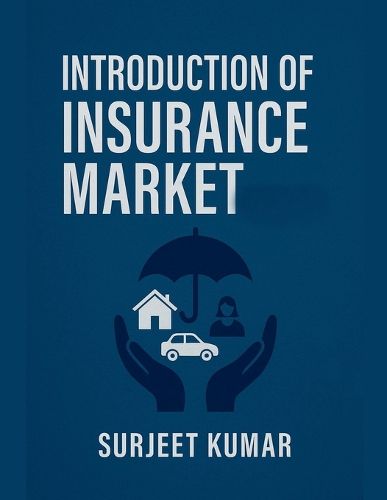Readings Newsletter
Become a Readings Member to make your shopping experience even easier.
Sign in or sign up for free!
You’re not far away from qualifying for FREE standard shipping within Australia
You’ve qualified for FREE standard shipping within Australia
The cart is loading…






This title is printed to order. This book may have been self-published. If so, we cannot guarantee the quality of the content. In the main most books will have gone through the editing process however some may not. We therefore suggest that you be aware of this before ordering this book. If in doubt check either the author or publisher’s details as we are unable to accept any returns unless they are faulty. Please contact us if you have any questions.
Introduction of Insurance Market is a definitive resource that delivers a clear, authoritative, and forward-thinking perspective on the insurance sector. Crafted for students, aspiring professionals, educators, and industry practitioners, this book offers a strategic blend of academic rigor and market relevance, making it indispensable for anyone looking to build a strong foundation or deepen their understanding of the insurance domain. With a logical flow and contemporary insights, this volume unpacks the complexities of the insurance ecosystem in three well-structured chapters: Chapter 1: Insurance Industry Overview and Market Structure This chapter sets the stage with a thorough exploration of the evolution, structure, and regulatory landscape of the insurance industry. It examines the roles of public and private players, the emergence of regulatory institutions, and how governance frameworks shape market efficiency and policyholder confidence. Chapter 2: Market Products, Distribution, and Customer Segments Diving into the operational core of the industry, this section offers a detailed examination of life, non-life, and emerging insurance products. It also analyzes the shifting dynamics of distribution - from traditional agency models to cutting-edge digital platforms - alongside sophisticated segmentation strategies that insurers deploy to serve diverse consumer profiles. Chapter 3: Trends, Challenges, and Opportunities in the Insurance Market This forward-focused chapter investigates the transformative impact of digitalization, the rise of FinTech and InsurTech, evolving consumer expectations, and regulatory pressures. It also spotlights emerging opportunities in underserved markets and the rise of hyper-personalized insurance solutions tailored to the modern policyholder. Whether you are preparing for a career in insurance, making policy decisions, or simply aiming to stay ahead in a rapidly changing financial sector, this book serves as a trusted guide. Its practical insights, supported by contemporary data and real-world scenarios, bridge the gap between theory and application. Why This Book Matters: 1. Equips learners with industry-specific knowledge and analytical tools 2. Aligns with current academic curricula in business, finance, and insurance 3. Integrates real-time industry trends and challenges 4. Ideal for BBA, MBA, commerce, and professional certification programs
$9.00 standard shipping within Australia
FREE standard shipping within Australia for orders over $100.00
Express & International shipping calculated at checkout
This title is printed to order. This book may have been self-published. If so, we cannot guarantee the quality of the content. In the main most books will have gone through the editing process however some may not. We therefore suggest that you be aware of this before ordering this book. If in doubt check either the author or publisher’s details as we are unable to accept any returns unless they are faulty. Please contact us if you have any questions.
Introduction of Insurance Market is a definitive resource that delivers a clear, authoritative, and forward-thinking perspective on the insurance sector. Crafted for students, aspiring professionals, educators, and industry practitioners, this book offers a strategic blend of academic rigor and market relevance, making it indispensable for anyone looking to build a strong foundation or deepen their understanding of the insurance domain. With a logical flow and contemporary insights, this volume unpacks the complexities of the insurance ecosystem in three well-structured chapters: Chapter 1: Insurance Industry Overview and Market Structure This chapter sets the stage with a thorough exploration of the evolution, structure, and regulatory landscape of the insurance industry. It examines the roles of public and private players, the emergence of regulatory institutions, and how governance frameworks shape market efficiency and policyholder confidence. Chapter 2: Market Products, Distribution, and Customer Segments Diving into the operational core of the industry, this section offers a detailed examination of life, non-life, and emerging insurance products. It also analyzes the shifting dynamics of distribution - from traditional agency models to cutting-edge digital platforms - alongside sophisticated segmentation strategies that insurers deploy to serve diverse consumer profiles. Chapter 3: Trends, Challenges, and Opportunities in the Insurance Market This forward-focused chapter investigates the transformative impact of digitalization, the rise of FinTech and InsurTech, evolving consumer expectations, and regulatory pressures. It also spotlights emerging opportunities in underserved markets and the rise of hyper-personalized insurance solutions tailored to the modern policyholder. Whether you are preparing for a career in insurance, making policy decisions, or simply aiming to stay ahead in a rapidly changing financial sector, this book serves as a trusted guide. Its practical insights, supported by contemporary data and real-world scenarios, bridge the gap between theory and application. Why This Book Matters: 1. Equips learners with industry-specific knowledge and analytical tools 2. Aligns with current academic curricula in business, finance, and insurance 3. Integrates real-time industry trends and challenges 4. Ideal for BBA, MBA, commerce, and professional certification programs